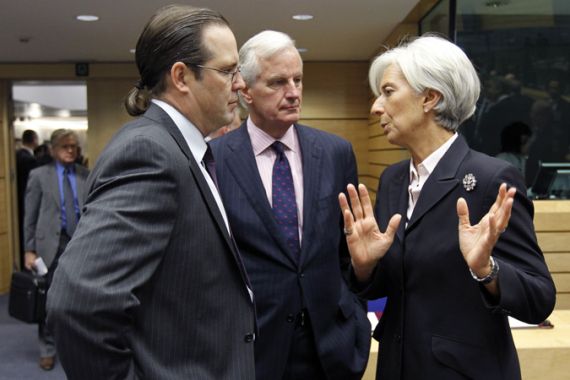EU ‘agrees’ on plan to bolster banks
Official says finance ministers agree in principle to framework to recapitalise banks to help resolve Greek debt crisis.

European Union finance ministers have “agreed in principle” to a framework to recapitalise banks to help resolve a debt crisis that threatens to damage the global economy, sources at the EU have said.
“There is an agreement in principle for a bank recapitalisation of 100 billion euros,” an official said on Saturday. A second source confirmed that a framework had been agreed to reinforce banks’ capital.
Keep reading
list of 4 itemsEcuador weighs security, international arbitration in latest referendum
‘Triple spending’: Zimbabweans bear cost of changing to new ZiG currency
Boeing hit with 32 whistleblower claims, as dead worker’s case reviewed
Nicolas Sarkozy, the French president, said on Saturday that progress had been made in talks to resolve the crisis ahead of a meeting of the region’s leaders on Sunday.
“These are absolutely crucial meetings, solutions must be found, the financial situation must be stabilised. This financial crisis must be resolved,” Sarkozy told journalists in Brussels.
“Progress has been made. Between now and Wednesday a solution must be found, a structural solution, an ambitious
solution, a definitive solution,” Sarkozy said. “There’s no other choice.”
Asked whether he was confident about the talks, Sarkozy said: “Yes, otherwise I wouldn’t be here.”
British Finance Minister George Osborne also said a swift solution for the eurozone debt crisis is crucial for the region’s economy.
“We’ve had enough short term measures, sticking plasters that just get us through the next few weeks,” he told reporters. “We need to address the root causes of the problem.”
The finance ministers have been in deadlock over shoring up European banks, after eurozone countries called for steeper losses for holders of Greek bonds.
With France and Germany divided over how to bolster the rescue fund that underpins the eurozone, leaders have scheduled a string of meetings in the next days to tackle Greece’s debt and limit its impact on the banking system.
Around a thousand people took part in an demonstration in front of Germany’s lower house of parliament on Saturday, to show their unhappiness over how the government has dealt with the financial crisis.
The protesters sat out in a field in front of the Reichstag building, where the lower house of parliament, or Bundestag is housed, holding banners and flags against the country’s financial policies.
“Banks should no longer be saved, but rather people should be saved. Profit is more often more important than people and that is why I am demonstrating,” a protester said.
Eurozone finance ministers made some progress on Friday, agreeing that holders of Greek government bonds would need to take far more than the 21 per cent cut brokered in July.
“We have agreed yesterday that we have to have a significant increase in the banks’ contribution,” Jean-Claude Juncker, who chairs the euro group of finance ministers, said on Saturday morning.
Rescue fund
On Saturday, EU finance ministers – including those from countries not in the eurozone – were trying to decide ways to bolster the capital of European banks to cope with any Greek default and wider contagion across the continent.
EU officials say almost 100bn euros ($139bn) are required to reinforce the region’s banking system. Banks that cannot raise money on the markets will have to turn to national governments, and finally to the European Financial Stability Facility (EFSF).
European banks will be required to increase their core tier one capital ratio to 9 per cent to help them withstand losses on sovereign debt, officials have said.
However, the European Commission will urge ministers not to announce a plan on bank recapitalisation before they have settled other issues, one EU official said.
These issues included the size of losses for holders of Greek bonds and how to boost the firepower of the eurozone’s rescue fund, the EFSF.
“You cannot just progress on recapitalising banks,” the official said. “You also need to see progress on those other issues. They are interlinked.”
Three of the EU executive’s top officials – Olli Rehn, monetary affairs head, Michel Barnier, the commissioner in charge of financial regulation, and antitrust chief Joaquin Almunia – will deliver this message at the meeting of EU finance ministers on Saturday, the official said.
There is also disagreement over how to recapitalise banks, in particular the extent to which taxpayers’ money should be used.
Discussions over the weekend are expected to include ways to make Greece’s debt mountain more manageable.
A bleak analysis by the EU and the International Monetary Fund showed on Friday that private holders of Greek debt may need to accept losses of up to 60 per cent on their investments.